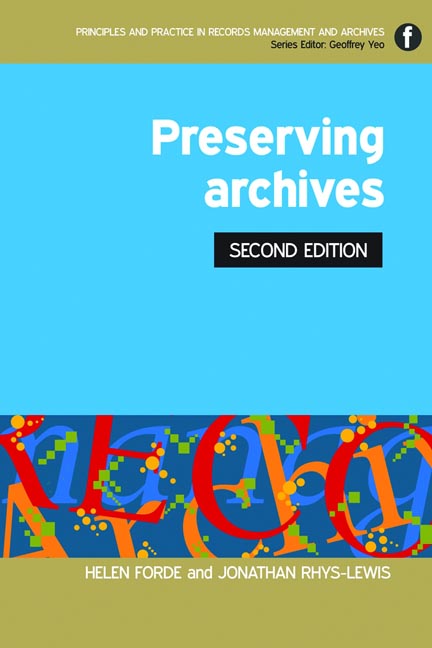Book contents
- Frontmatter
- Contents
- Introduction to the series Geoffrey Yeo
- Preface to the Second Edition
- Acknowledgements
- 1 Introducing archive preservation
- 2 Understanding archival materials and their characteristics
- 3 Managing digital preservation
- 4 Archive buildings and their characteristics
- 5 Safeguarding the building and its contents
- 6 Managing archival storage
- 7 Managing risks and avoiding disaster
- 8 Creating and using surrogates
- 9 Moving the records
- 10 Exhibiting archives
- 11 Handling the records
- 12 Managing a pest control programme
- 13 Training and the use of volunteers
- 14 Putting preservation into practice
- Appendices
- Bibliography
- British and international standards relating to archive preservation
- Index
Preface to the Second Edition
Published online by Cambridge University Press: 09 June 2018
- Frontmatter
- Contents
- Introduction to the series Geoffrey Yeo
- Preface to the Second Edition
- Acknowledgements
- 1 Introducing archive preservation
- 2 Understanding archival materials and their characteristics
- 3 Managing digital preservation
- 4 Archive buildings and their characteristics
- 5 Safeguarding the building and its contents
- 6 Managing archival storage
- 7 Managing risks and avoiding disaster
- 8 Creating and using surrogates
- 9 Moving the records
- 10 Exhibiting archives
- 11 Handling the records
- 12 Managing a pest control programme
- 13 Training and the use of volunteers
- 14 Putting preservation into practice
- Appendices
- Bibliography
- British and international standards relating to archive preservation
- Index
Summary
Preserving Archives is a guide for all those with a responsibility for archival or special collections on the issues to be dealt with in developing successful preservation policies and strategies. While the chapters build up to implementation, they can also be read individually if required. Some archives will need advice on specific problems, others will require assistance with developing more general programmes. The reader can pick and choose as necessary; the notes and references, example boxes in the text and bibliography present further guidance for those who require more specific details.
The text is based on lectures given to successive cohorts of postgrad uate archive students in the UK, from those who have recently taken their first degree to those who are acquiring a professional qualification at a later stage in their careers. Preserving Archivesis intended to act as an aide-mémoire for them and their successors as students, as well as others who may need assistance in a particular situation. The book can be used as an overall guide or as a reference source for a particular area of practice. And it is not only for archivists: librarians and museum curators are also often faced with difficult decisions to make on preservation and much of what is included applies to paper-based materials held in other organizations. National and international examples are given and referred to, making comparisons possible and introducing the reader to a wider picture than just the UK. While there will clearly be national differences, many of the baseline and guiding principles will be evident in all forms of collection management and it is for the individual users to refer to their own national standards where appropriate.
The importance of understanding more traditional archival materials is underlined by its prime place at the beginning of the book, followed by the equally important topic of preserving digital material. The crucial role played by archival buildings, the security within them and the importance of good storage conditions for the archival materials are central to the text, followed by an emphasis on developing strategies to mitigate disasters. Clear guidance is given on how to manage and develop policies for the use of surrogates in both analogue and digital formats.
- Type
- Chapter
- Information
- Preserving Archives , pp. xiii - xivPublisher: FacetPrint publication year: 2013



